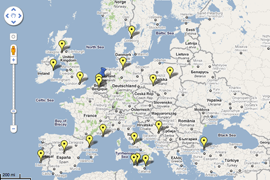For more than six years, Jeannette Petri, also known as Jee-Nice, has been publishing Anattitude, the one and only international print magazine about females in hip hop. It is a rather unique project initiated by a rather unique person.
Her light eyes look firm as she peers briefly at the person sitting across from her. Jeannette Petri prefers to talk about other people instead of herself. As both editor-in-chief and head reporter of a yearly print magazine, she is usually the one to ask the questions. Still, there is a lot worth knowing about the woman with the black Def Jam shirt and the low-waist pants.
Jeannette Petri was born in Dusseldorf, Germany some 30 years ago, she admits with a smile. Having always been attracted to the art of photography, she decided to become a student of video and photography at Academy of Art & Design in Offenbach.
During her years of study in Western Germany, she had an encounter that changed her life completely: “The very moment that brought me to women’s hip hop…” – which actually took place inside a car on the way to the building centre. “We were listening to the radio in the car. I still remember the channel; it was Zündfunk, from Bavaria.” The radio station broadcasted a feature about Roxane Shanté, one of the first female MCs worldwide, doing a freestyle rap.
“’That’s it!’ I thought. This power kept me hypnotized from the very beginning”
“I was so completely fascinated by that woman, I couldn’t exit the car. I felt as if I was under a spell, I had to listen to the piece until the very end.” She had never felt specifically attracted to hip hop before, but when she heard the powerful rhymes of the young American girl, Jeannette Petri immediately fell for it. “‘That’s it!’ I thought. This power, this directness just kept me hypnotized from the very beginning.”
From this moment on, she started looking for women in hip hop and their music everywhere she went. “In every city I came to my first way would be to the record store searching for some vinyl. But it was really hard to find something about these ladies, be it their music or just some information. That made me feel really sad,” she says. So she decided to do something herself. Her goal was to make her discoveries about female hip hop more public and share with others what she had found so fascinating about this genre.
As her own music collection grew, soon Jeannette Petri felt that she also wanted to contribute to this captivating music that she had fallen in love with. In 2000 she started her career as DJ Jee-Nice, a synonym of her first name translated into English, more for practical reasons than out of musical ambitions, though. “I wanted to hear this kind of music when I went out. But as there was no chance to find it in any club or bar, I figured I had to play it myself.” The second step was a printed reader of female hip hop history called Here’s a little story that must be told, which Jeannette Petri presented in 2004 as her minor diploma. She collected all the information she could find about female hip-hop artists worldwide and their influence on the hip-hop movement.
“I wanted to create an antidote to the one-sided, boring way the media represented women in hip hop”
Finally, her “baby” was born in 2005. Jeannette Petri named it after what she wanted it to become: an attitude. From the first volume on, with her print magazine Anattitude, she aimed at closing a gap that she felt had been yawning for years in the hip hop world. She wanted her magazine to be “an antidote to the one-sided, boring, even nonexistent representation” of females in media coverage about contemporary hip hop culture.
Today, the magazine is the first and only international hip hop print magazine that represents the female side of a culture that is still often perceived as macho. When Jeannette Petri is flipping through her work, one gets an idea of how personally important the project is to her. The four published issues lying on the white garden table in front of her, as well as the fifth one, which is going to be on sale summer 2011, include over five years of research, hours and hours of editing, innumerable phone calls, and sleepless nights. But they also present over five years of excitement about interviews with people she only read about beforehand; years of inspiring meetings and co-operation with international contributors; and, last but not least, years of getting women in hip hop the attention they deserve.
“Today this issue might not be that peculiar anymore,” says Petri, “for instance, there are several hip-hop festivals for women nowadays. But this could only happen because we started it.” Looking back at all those years, she seems content for the most part with the milestones her magazine has reached so far. “I feel that I could pass something on. The attitude of the new generation has changed for the better, I believe.” Still, there will always be the need to make sure women in hip hop are represented in a proper way. For Petri, one thing is certain: “To me personally hip hop is always going to matter a lot. When I listen to some rap music, everything just immediately becomes clear, for hip hop has a message to tell.”
